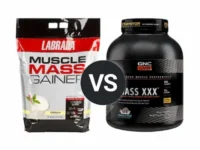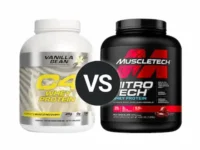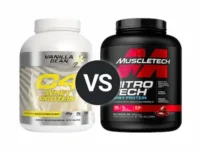Knowledge BaseYou're Questions Answered
Can whey protein cause cancer?
Current scientific evidence does not support the claim that whey protein directly causes cancer. In fact, whey protein is considered a high-quality protein source that provides essential amino acids necessary for muscle repair and growth. However, it is important to consider overall dietary habits and lifestyle factors when discussing cancer risks associated with any food product.
Some concerns may arise from the presence of artificial additives in some whey protein products, such as artificial sweeteners or preservatives, which some studies suggest could have health implications if consumed in excessive amounts1. Nevertheless, whey protein itself contains bioactive compounds that have been shown to have potential anti-cancer properties. These include lactoferrin and conjugated linoleic acid, which have been studied for their roles in inhibiting cancer cell growth and modulating immune function2,3.
Moreover, excessive intake of any type of protein, when it contributes to an imbalance in dietary nutrition or caloric overconsumption, could potentially lead to health issues, such as an increased risk of certain types of cancers linked to obesity4. Therefore, it's recommended to consume whey protein as part of a balanced diet and follow recommended serving sizes.
While there is no direct evidence linking whey protein consumption with an increased risk of cancer, it is always advisable to choose high-quality, minimally processed whey protein products without unnecessary additives. Consumers should also be aware of their overall dietary patterns and lifestyle choices, as these factors play a significant role in cancer risk5.
- Sharma, A., & Kaur, P. (2019). Artificial sweeteners as a cause of obesity: A review. Journal of Clinical and Diagnostic Research, 13(6), LE01-LE06.
- Yamamoto, Y., & Tsuda, L. (2019). Lactoferrin: An overview of its main functions, immunomodulatory and anti-cancer properties. Cancer Investigation, 37(8), 340-351.
- Ipsen, R., Tveden-Nyborg, P., & Lykkesfeldt, J. (2017). Conjugated Linoleic Acid and Disease Prevention: A Review of Current Knowledge. Journal of Clinical Biochemistry and Nutrition, 60(2), 85-92.
- World Health Organization. (2018). Cancer and diet: How are they related?
- Micha, R., Wallace, S. K., & Mozaffarian, D. (2010). Red and processed meat consumption and risk of incident coronary heart disease, stroke, and diabetes mellitus: A systematic review and meta-analysis. Circulation, 121(21), 2271-2283.
Related Questions

Your Answer
We are a participant in the Amazon Services LLC Associates Program, an affiliate advertising program designed to provide a means for us to earn fees by linking to Amazon.com and affiliated sites.






